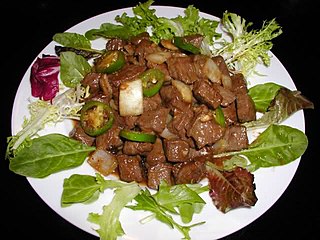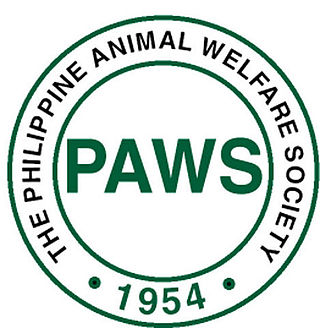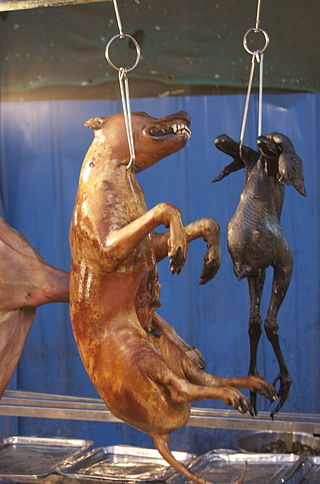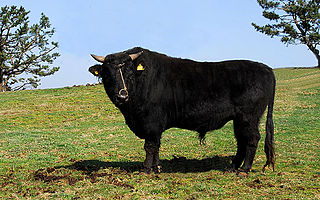Chinese Animal Protection Network (CAPN) is a non-profit animal protection organization, and the first network for animal protection in China, founded by Chinese people. CAPN is known for its pioneering role in the animal rights movement in China, leading the growing movement against eating cats and dogs, and providing a free encyclopedia on animal welfare information.
The Chinese Animal Protection Network was founded by Dr. Jenia Meng in 2004, with its first project, the Chinese Companion Animal Protection Network. [1] Since then, the organization has initiated projects targeting issues such as lab animal rights, vegetarianism, and opposition to indiscriminate culling as a method of population control of animals. [1] Those projects have led the direction of Chinese non-governmental organizations. [1]
By 2008, the organization had 48 member groups, two branches, and more than 20,000 individual supporters. [2] The organization reported on its website in 2014, that its network has expanded to reach almost every part of China, with more than 200 partner groups around world. [1]
CAPN has a science-based philosophy of animal rights. [3] They oppose violence in the animal rights movement, and see animal rights as a dynamic concept; they believe the rights of different animals are different because their needs are different. Six keys of the organization's philosophy, developed in 2008, include: [3]
The Chinese Companion Animal Protection Network (CCAPN) was launched in 2004 at the founding of CAPN. [1] The campaign against eating cats and dogs was the first concern of CCAPN. "Isolated animal welfare organisations were already working to rescue strays by then, but consumption of dogs and cats hadn’t made it onto their agenda. Indeed, these groups were unconvinced that stopping people from eating one or two particular species was anything but an exercise in arbitrary morality. So CAPN sought to reframe the debate as one about cruelty rather than taste," [2] thereby working to reduce the consumer market. Supported by international groups including the Royal Society for the Prevention of Cruelty to Animals and World Animal Protection, the organization worked to link animal-lovers across China and educate the public about the facts of the trade, for example that "many of the 10,000 cats consumed daily in winter in Guangdong province (where the meat is considered a warming food) are stolen from other provinces". [2]
In 2007, the organization "launched an online 'signing event' which asked people to pledge to avoid cat and dog meat in future. In the following five months, it collected 21,000 signatures." [2]
CCAPN's website in 2014 offers information on controlling rabies in dog populations through vaccination rather than culling, information on controlling domestic cat populations in urban areas through trap-neuter-return rather than culling, and how to create an animal protection agency. [4]
The Animal Rights in China website was launched on 22 July 2006, and is the major portal for animal rights issues in China. Academic research on animal ethics and networking of animal rights activists are important functions of this project. It is developing a Chinese online encyclopedia of animal protection (APpedia). [5] [6]
The main objective of APpedia (Chinese:ARC中文动保小百科) was to establish an online Chinese encyclopedia of animal protection. The project currently has more than 90 academic researchers and affiliated organizations around world. [7] [8]
APpedia is published online as a free-of-charge eBook and a website. The content of the APpedia includes, but is not limited to: Science, religion, events, animal behavior, philosophy, important figures, animal protection, advocacy, animal welfare, animal rights, animal protection organizations, reviews of books.
The beta version of APpedia website was launched in 2007, as a wiki website, visitors are allowed to modify the articles on the website without registration. Overall the project has a pro animal rights position. A derivative of the project, a book with the same title, was published 2009 in Australia.
The sponsors of the free knowledge project include World Society for the Protection of Animals and Culture & Animals Foundation. [9] [10]
POVchina is an information portal for vegetarianisms. It is known for using interactive computer games in public education. [11]
CAPN projects have won several awards:

Dog meat is the flesh and other edible parts derived from dogs. Historically, human consumption of dog meat has been recorded in many parts of the world.

World Animal Protection, formerly The World Society for the Protection of Animals (WSPA) is an international non-profit animal welfare organization that has been in operation since 1981. The charity's mission is to create a better world for animals by protecting them.

Cat meat is meat prepared from domestic cats for human consumption. Some countries serve cat meat as a regular food, whereas others have only consumed some cat meat in desperation during wartime, famine or poverty.

The Philippine Animal Welfare Society (PAWS) is a volunteer-based, non-government organization whose goal is to prevent animal cruelty through education, animal sheltering and advocacy, based in Quezon City, Philippines. It was founded in 1954 by Muriel Jay. PAWS believes that the creation of a more peaceful society starts with the widening of mankind's circle of compassion which includes animals, thereby envisions a nation that respects animals, practices responsible pet ownership and protects wildlife. The volunteer-based organization rehabilitates these animals in the hope of finding them new homes and a second chance at a good life. PAWS does not take in pets of other people, but only victims of cruelty or neglect where the animal offenders are charged with violation of the Animal Welfare Act in court.
The National Animal Interest Alliance (NAIA) is a non-profit organization in the United States dedicated to promoting animal welfare and animal husbandry practices, strengthening the human-animal bond, and safeguarding the rights of responsible animal owners and professionals through research, public education and public policy. The NAIA mission is "to promote the welfare of animals."
The animal protection law of the People's Republic of China/Law on the Prevention of Cruelty to Animals 中华人民共和国动物保护法/反虐待动物法(专家建议稿) is a draft proposal of an animal protection law in China released on September 18, 2009. The draft was authored by a team of legal scholars led by Prof Chang Jiwen (常纪文), director of social law research department at the Chinese Academy of Social Sciences. It has yet to be adopted by the legislature. Any such law must go through the legislative process of the national legislature National People's Congress.

The consumption of dog meat is now heavily restricted but legal in South Korea. It is the subject of ongoing and significant controversy. In a 2020 survey of South Koreans, 83.8% of respondents reported never having consumed dog meat nor having plans to ever do so. In June 2018, a South Korean municipal court ruled that killing dogs for their meat was illegal, though this law did not make it illegal to consume dog meat.
Animal welfare and rights in the People's Republic of China is a topic of growing interest. China has had limited animal protections by international standards, and animal-rights activists have condemned the treatment of animals in the country. Movements towards animal welfare and animal rights are expanding in China, including among homegrown Chinese activists, but face resistance from nationalists.
Korea Animal Rights Advocates (KARA) is a non-profit organization that supports animal welfare in Korea and deals with animal cruelty cases. It is also responsible for the care of abandoned animals and their adoption.
Animal welfare in Egypt is a neglected issue. There are only a few organizations that support the rights and wellbeing of animals.

The Lychee and Dog Meat Festival is an annual festival held in Yulin, Guangxi, China, during the summer solstice in which festival goers eat dog meat and lychees. The festival began in 2009 and spans about ten days during which thousands of dogs are reportedly consumed. The festival has drawn criticism internationally.

Animal welfare and rights in South Korea is about the laws concerning and treatment of non-human animals in South Korea. South Korea's animal welfare laws are weak by international standards. There are a handful of animal welfare and rights organizations working in South Korea, which appear to be focused largely on the welfare of companion animals and the dog meat trade.
Animal welfare and rights in South Africa is about the treatment of and laws concerning non-human animals in South Africa.
Animal welfare and rights in Indonesia regards the treatment of and laws concerning non-human animals in Indonesia. Indonesia has limited animal welfare regulations by international standards.

This article is about the treatment of and laws concerning non-human animals in Australia. Australia has moderate animal protections by international standards.

Four Paws is a global animal welfare organisation based in Vienna, Austria. The organisation is focusing on gradually improving the living conditions of animals under direct human influence, by revealing suffering, rescuing animals in need and protecting them.
NoToDogMeat is a UK-based animal rights charity which supports rescue centres in countries which have a dog meat and cat meat trade. The charity, which is legally known as World Protection for Dogs and Cats in the Meat Trade, also campaigns against the killing of animals in the fur trade. NoToDogMeat operates around the world.

Network for Animals (NFA) is a campaign-directed to animal welfare organization that financially supports and provides logistical help for animal shelters, animal welfare initiatives and raises public awareness about animal issues in Australia, Croatia, Greece, Italy, Jordan, Kenya, Mauritius, Montenegro, the Philippines, South Africa, Serbia, Thailand, Turkey, the United Kingdom, Uruguay, the United States, Zimbabwe, Australia, Malta, and Israel.
Genlin, also known as Horiike Hiroshi (Japanese) and Peng Hongling, is a Chinese entrepreneur, philanthropist, painter, animal activist and the founder of Large Horse International (Group) Company Limited and World Dog Alliance.
Animal welfare and rights in Hong Kong relates to animal rights, such as the treatment of non-human animals in fields such as agriculture, hunting, medical testing, animal conservation, and the domestic ownership of animals in Hong Kong, and are generally protected under Cap. 169 Prevention of Cruelty to Animals Ordinance, Cap. 169A Prevention of Cruelty to Animals Regulations, Cap. 139 Public Health Ordinance, Cap. 167 Dogs and Cats Ordinance and Cap. 421 Rabies Ordinance.